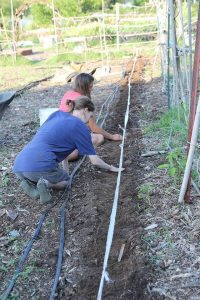To visit the GOE, interested persons must fill out an application and agreement.
While I was not looking to become a member and only wanted to visit the community, I was asked to fill out the agreement. Although the information is on their website, it was not something I had any knowledge of until community members told me.
I immediately felt put off. Though I liked the community, I was not ready to sign the agreement. Nor did I.
In consequent Facebook messages, a member said they were upset that I didn’t want to see the community. I had to correct them and say I had nothing with the community; instead I did not feel comfortable signing. Their reaction, however, made me wary. I had imagined GOE would be more understanding than they were.
The agreement stated, “Any/all visitors acknowledge and agree to be responsible for their bodies, and further agree to operate at all times on the GOE premises.” The document also said, “Visitors further acknowledge and agree not to disclose private information, without special permissions: any/all documents, photos, videos, conversations by any inhabitant, about the premises or activities, events, to or with anyone.”
I couldn’t understand that the community wanted me to fill the agreement out. For me, it spoke volumes as they wanted everyone (visitors and members alike) to sign the agreement.
Here is the current visitors agreement form.
–
Membership application and agreement
The membership application and the membership agreement are forms that prospective members have to fill out. Similarly, the agreement must be completed by anyone who wishes to enter GOE’s gates.
Tours are announced on the community’s Facebook. Private tours are granted to members. There is a cost for any visitor – even for member’s families.
As I mention elsewhere, the application and agreement is typical of a community that wants members to match their ideologies. This was found in Rosabeth Kanter’s research, which stated long-term communities often seek an “ideological conversion before admission” (127). Though GOE may be different, Kanter said some communities require prospective members to fill out an application, even though they may not be accepted.
–
Membership agreement and responsibilities

Members are expected to work roughly 50 hours a week in return for room and board, utilities, Internet access, and community involvement. However, as this was stated before, ‘rent’ agreements can be reached if members would rather work outside of the community.
Those who are willing to work outside jobs for pay and who want to contribute less of their time and more material resources, can live under a ‘rent’ agreement.
Under this agreement, money, goods, or services are exchanged for membership in the community.
Full-on participation can include: working in the garden, sustainable upgrades for the property, cleaning indoor or outdoor spaces and providing cleaning, painting, or artwork, working on the expansion of the community, or earning money while also supporting life at the community.
Through working, Erik Reece in Utopia Drive said whatever is lost in individualism is gained through collectivism. “When, for instance, ten people are cooking dinner for the whole group, instead of one hundred people fending for themselves, a lot of time and labor gets saved” (196). In this same way, the community at the GOE works together to feed, house, and clothe each other.
At the same time, this labor can be used to build commitment, as Kanter’s research showed communities often use, “recruitment, property, work, decision making, [and] leadership,” to build loyalty to a community. As seen at the GOE, members have to work to keep their membership. This helps to ensure that members will continue to work for the community, as, if members do not work, they are likely to lose their home at the community.
Kanter also stated, “The more commitment mechanisms a community institutes. . .the greater its chances for success” (138). The GOE’s members are completely committed to the community, as many do not have outside jobs or homes. The GOE’s success is based partly on the fact that members will continue to do for the community as they have nothing outside of the three acres.